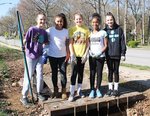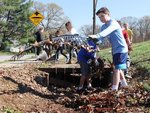 Severna Park
Severna ParkOvercast, 53°
Wind: 9.2 mph, E
 Severna Park
Severna Park





“With great power comes great responsibility.” The well-known adage came from Peter Parker’s uncle Ben, but it’s equally applicable to the real world, and more specifically, to the next generation of Severna Park residents who will be entrusted with protecting the natural landscape in their community.
At Severna Park Middle School, which held a schoolwide cleanup during Earth Week for the fifth consecutive year, students converted that thought into action.
“The team decided that with the renovations to the school building, we would like to engage our students in its upkeep to empower them to look out their window knowing they were responsible for that area looking the way it does,” said Debbie Sparby, a sixth-grade science teacher.
In 2013, a group of teachers and volunteers applied for and were awarded grants from Chesapeake Bay Foundation, Northrop Grumman and Unity Gardens to allow students to install two rain gardens on the campus.
“These rain gardens promote infiltration of stormwater to allow the ground to naturally clean runoff that pollutes the Magothy and Severn rivers that flow to the bay,” Sparby said.
“The point of making the step pools and stone weirs is to slow the flow of the water as it comes down the storm outlet and have it pool in the areas,” she added. “The ground acts as a natural filter. Each pool in the succession has much clearer and cleaner water. The point of them is to promote infiltration of stormwater into the ground.”
Watershed Steward John Dawson designed the rain gardens. “I’ve lived here all my life,” Dawson explained. “I remember when the grasses were so thick, they would wrap around the boat’s motor.”
Dawson also informed students how, after a rainstorm, the bay “looks like someone poured coffee with too much milk.”
During the 2018 cleanup, Dawson again rented equipment from the Baltimore Community ToolBank, and, a week prior to the cleanup, he led a lesson in which students simulated the design of a rain garden.
Once the time arrived to weed, rake and mulch, sixth-graders at Severna Park Middle eagerly jumped into action, explaining why it was important to maintain the rain gardens.
“We’re cutting up branches from the tree and restoring a rain garden to clean pollution from the bay,” said Lily Oswald.
Ryan Zachry said, “We found cans, plastic bottles and wrappers. We’re learning about the cleanliness of the Chesapeake Bay, and all this stuff could be runoff.”
As Carter Crivella noted, “I learned that the school is at the highest point in Severna Park and the runoff goes into two rivers.”
To Carter’s point, runoff from the Jumpers Hole side of the school drains into the Magothy and contaminants from the Lynwood side travel to the Severn.
Dawson also had the kids install native plants: red trig dogwood, rush, rose mallow, butterfly weed and blue iris.
As successful as it was, this year’s cleanup was, at one point, in doubt. Sparby said the school needed $1,000 worth of mulch — a cost normally covered in part by students and part by the PTO — but the PTO had to dedicate its funds to replace failing technology. Pasadena Wal-Mart manager Bobby Smith awarded SPMS a grant that covered the cost of the mulch and yard waste bags. Employees Deon Jones and Daquan Miller were also helpful.
Sparby also emphasized, “A lot goes on behind the scenes starting back in January and could not occur without support from our principal, Sharon Hansen; our financial secretary, Debbie Schaeffer; and our head custodian, Jackie Evans. Every time we complete the cleanup, I hear so much feedback from staff, students and parent volunteers about how much better it looks and the students are filled with so much pride.”
As the school year progresses, students will learn more about how the Chesapeake Bay is impacted by various factors: microplastics, stormwater, impervious surfaces, invasive species, nutrient runoff, ocean acidification due to carbon emissions and overfishing, and overdevelopment.
They won’t forget the hands-on experience from Earth Week.
“It’s important to get these kids invested in taking care of the environment,” Dawson said. “And the students get their community service hours, so it’s a win-win for the school.”
Comments
No comments on this item Please log in to comment by clicking here